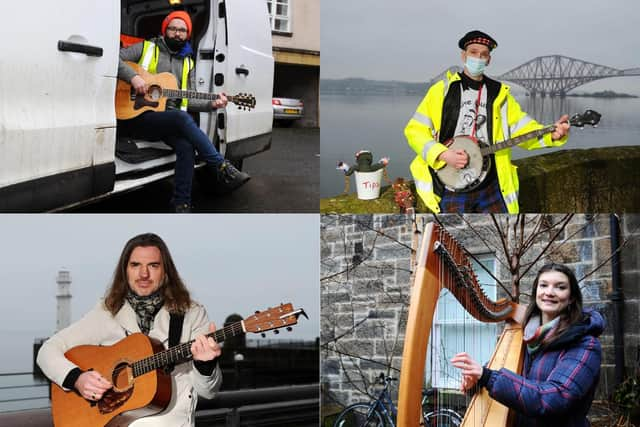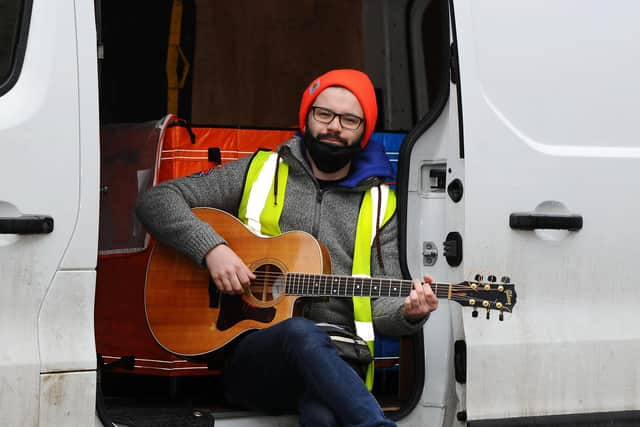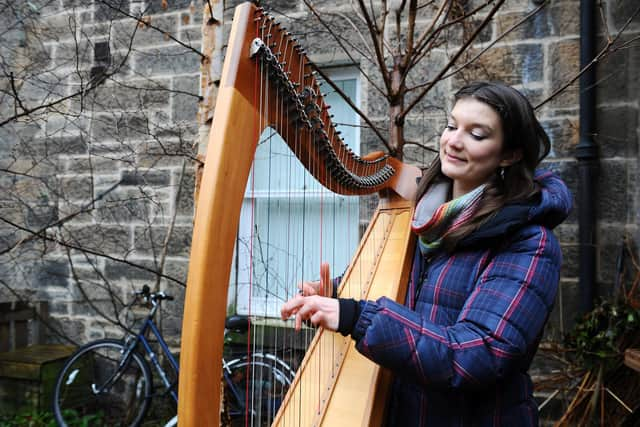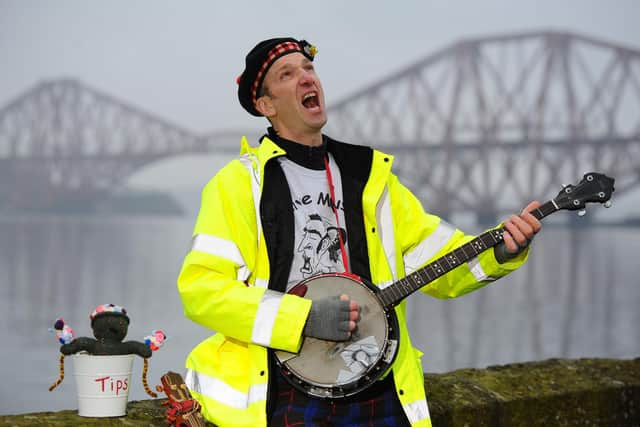'I will never complain about being asked to sing Wonderwall again' - How Covid has impacted Edinburgh's pub musicians
and live on Freeview channel 276
But this time, the 27-year-old singer-songwriter is playing in front of his laptop screen in the back of a delivery van.
Ciaran, who is one of the Capital’s most recognised pub musicians, now works for Amazon.
Advertisement
Hide AdAdvertisement
Hide AdNormally seen stomping on tables in the Royal Oak with revellers bellowing along to his celtic renditions, the musician now struggles to find the time for an online gig in between busy shifts delivering parcels - a job he has had to take on to make ends meet.


The guitarist is one of many of Covid’s forgotten victims - the live musicians who played night after night in the Capital’s pubs giving the authentic nightlife its reputation, those whose lives have been totally upended by the coronavirus pandemic.
“I don’t feel like a musician anymore,” said Ciaran, who used to play gigs seven nights a week.
“A huge part of my identity has gone. I never left the house without my guitar on my back and now I deliver parcels. It’s soul destroying.
“I miss the crowds, I miss the people.
Advertisement
Hide AdAdvertisement
Hide Ad

“I miss the intimate folk nights and even the nights where I was asked to play the same cover songs over and over.
“I will never complain about being asked to sing Wonderwall ever again.”
“It’s only temporary, it’s only temporary,” Ciaran says as the conversation about him returning to being a full-time musician anytime soon becomes more bleak.
His main fear is not losing the Friday night Oasis-mad revellers, but rather those mid-week gigs where he played traditional folk to smaller crowds made up of an older demographic.


“Some nights I played 15 minute Irish ballads,” he said.
Advertisement
Hide AdAdvertisement
Hide Ad“Those were specific to small venues, which we might lose for good, and for an older audience, most of whom would now be classified as vulnerable and may not come back out, if they’ve survived this.
“I worry I won’t see those nights ever again.”
Siannie Moodie, who plays the clàrsach, is another one of Edinburgh’s established folk musicians who went from earning a living as a full-time musician to having to sign on for universal credit overnight.


The 30-year-old, who has since got a job at The Chaumer cafe to pay bills, said the pandemic has robbed musicians of the connection they nurture when gigging together.
Sitting shoulder-to-shoulder in a cosy pub like Captain’s Bar with instruments criss-crossing over each other is second nature to live performers and pivotal for developing as a musician.
Advertisement
Hide AdAdvertisement
Hide Ad“That spontaneity and sense of community that you get in a pub session, sitting with other musicians, is just a lifeline for so many of us,” she said.
“It was how I developed. When you’re around others you pick up tunes that aren’t written down and hear the stories behind them. That’s what gives music its soul and connection.”
With UK Covid deaths surpassing the 100,000 mark, most of which are the elderly, Siannie said she already laments some of the old faces she cherished who may never return to the pubs for a gig.
“The harsh reality is some of those people I saw across the room won’t be there when I get back.
Advertisement
Hide AdAdvertisement
Hide Ad

“This virus will have caused a huge dent in the music community in Edinburgh.”
What can fans do to support musicians such as herself?
“Look up your local musician online,” Siannie said.
“Find a video of them, like it, share it, you don’t have to pay anything, just recognising them and enjoying their music or requesting a song for them to perform online is something.”
Gigging in a small venue may be on hold, but one Edinburgh musician and his ukulele have prevailed over Covid’s silencing of live, in-person performances.
Graeme Pearson, who has been playing in the Capital for the last 25 years, sang for colleagues shortly after taking up a job in the Dunfermline Amazon warehouse last year.
Advertisement
Hide AdAdvertisement
Hide AdThe 55-year-old, who also plays the guitar and banjo, was regularly seen down at The Black Bull charming locals and tourists with his folk music and storytelling.
While filling the city’s haunts with his singing is on hold, the multi-instrumentalist couldn’t help but sneak his ukulele into the warehouse’s canteen one morning during lockdown.
“‘What’s that you’ve got in your hand’, my manager said to me one day in the warehouse,” Graeme said.
“‘It’s a ukelele,’ I replied, feeling usure about how he’d react.
“‘Well why don’t you play it in the warehouse?’
Advertisement
Hide AdAdvertisement
Hide Ad"And that was that. I played once a week, walking around the warehouse which is the size of about 18 football pitches singing while wearing a mask.”
Graeme’s lockdown live music came to an end after his contract finished at the end of last year. He is now delivering Covid tests for the NHS.
“I’ve been okay, but it’s the people I miss. Losing that interaction is the most painful thing for musicians right now.”
Making the shift online has been important for most jobs since Covid hit, but for live musicians who want to play full-time it has been a necessity.
Advertisement
Hide AdAdvertisement
Hide AdKevin Gore, from Edinburgh, has been furloughed as a self-employed musician and spent his lockdowns developing his recording skills and marketing his music.
The 54-year-old, who is normally used to crowds shuffling around him and jet-setting off on tour in Europe with his guitar, has channelled his energy for live performances into new albums.
"I have learnt a lot about promoting my work as an artist which I didn’t have time to do before,” he said.
“I have released an album, The Edinburgh Man, which is a progression from a single I released as a tribute to Ken Buchanan and I am working on another one."
Advertisement
Hide AdAdvertisement
Hide AdBut like the others, Kevin misses a live audience and said the online gigs have been a “culture shock.”
"It’s difficult, but lockdown needs to be done.
"If you’re in music, which can always be a bit of a precarious path, you need to be creative and have ways to back yourself up.”
Even with coronavirus restrictions easing at points over the last year, live music inside venues has remained forbidden since the day the pandemic closed all pubs in March last year.
A message from the Editor:
Thank you for reading this article. We're more reliant on your support than ever as the shift in consumer habits brought about by Coronavirus impacts our advertisers.
If you haven't already, please consider supporting our trusted, fact-checked journalism by taking out a digital subscription.
Comment Guidelines
National World encourages reader discussion on our stories. User feedback, insights and back-and-forth exchanges add a rich layer of context to reporting. Please review our Community Guidelines before commenting.